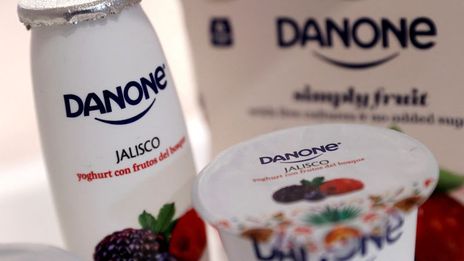PARIS (Reuters) - As French foods group Danone SA (>> DANONE) grapples with a series of problems in China and other Asian markets, a sales update due in mid October will give the company the next chance to enlighten investors on the overall impact.
So far the maker of Aptamil, Actimel and Activia has played down the effects, even of an Asian recall of high-margin baby formula, but its sangfroid could yet be tested.
Analysts have already been trimming estimates amid mounting concern profitability goals could be at risk.
"We expect a tough third-quarter on negative baby food volumes and a likely cautious tone on full-year guidance," said HSBC analyst Cedric Besnard.
The company-compiled consensus of analyst forecasts for third-quarter sales due on October 16 is for like-for-like baby food sales to fall 3.1 percent in the quarter, reversing a 15.2 percent jump in the first-half of the year.
Danone, which could not be immediately reached for comment on Friday, has faced a variety of problems in China this year.
In July it was hit by a fine and had to cut prices in China after a milk-powder price-fixing probe. Then in August it had to recall infant formula products in Asia due to an unfounded health scare stemming from New Zealand-based supplier Fonterra (>> Fonterra Shareholders' Fund).
Most recently two of its units, Dumex in baby food and Nutricia in medical nutrition, faced bribery allegations in China, which they are investigating.
"The key questions are how damaged are the company's Asian baby food brands, what will the pace of recovery be and can the previous run-rate of sales be restored?" asked Societe Generale analysts in a note.
There's plenty at stake.
China is an important market for Danone's baby food division, which accounts for 20 percent of group sales, making it the No 2 contributor after dairy.
Baby food is also Danone's most profitable division, with an operating margin of 20.5 percent of sales in the first half, helping it counter a weak performance in dairy in Europe.
UNDER SCRUTINY
Danone continues to benefit from booming demand for foreign-branded baby milk in China following a 2008 scandal when tainted local formula killed at least six infants.
But foreign firms have lately come under scrutiny in China, which in August fined six companies including Danone and Fonterra a total of $110 million following an investigation into price fixing and anti-competitive practices.
"Danone has an image problem in a food category that may be one of the most sensitive to image ... Restoring this image will thus take time," said Natixis analyst Pierre Tegner.
Danone shares had built a valuation premium to their peers in recent months, but that has faded, with the stock trading at around 17.5 times 12-month forward earnings against 17.4 for Nestle (>> Nestle SA) and 17.2 for Unilever (>> Unilever plc) (>> UNILEVER), according to Reuters data.
Danone said in August that the Asian infant formula recall would result in a fall in sales at its baby food division in the third quarter, but kept intact its goals for group sales and profitability this year.
Analysts however expect Danone to struggle to deliver on its goal to limit its operating profit margin decline to between 30 and 50 basis points (bp) this year and to boost profitability next year.
The median consensus of analysts is for a 51 bp margin decline for 2013 to 13.37 percent, with the most pessimistic estimates eyeing a 80 bp drop. The 2014 margin is seen rising only slightly to 13.81 percent.
This factors in the slowdown in baby food sales and a need to step up marketing spend to restore Asian consumer trust.
"We expect Chinese infant milk margins, which we estimate in the mid-20s, to gradually decline to mid-teens over the next 12 months as the company is forced to increase brand investments, HSBC's Besnard said.
Natixis analyst Tegner estimates the Fonterra recall could cost Danone 280 million euros in sales and 140 million in operating profit or EBIT (earnings before interest and taxes) this year. Credit Suisse said in a note that baby food sales in China fell 75 percent in August, due to the Fonterra recall.
Some of the recall costs may be mitigated by compensation Danone will seek from Fonterra. What's unknown is the size of that compensation.
(Editing by David Holmes)
By Dominique Vidalon and Noëlle Mennella


 By
By 









